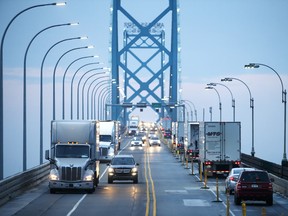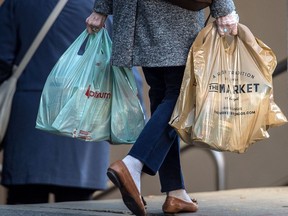China’s newfound willingness to throw its weight around is alarming, experts say, and reinforces the need for Canada to pursue a revamped Asian economic strategy
Article content
Relations between Ottawa and Beijing are not likely to warm up anytime soon despite the release of the two Michaels, reinforcing the need for Canada to pursue a revamped Asian economic strategy, some China-watchers said Monday.
Advertisement
This advertisement has not loaded yet, but your article continues below.
Article content
On Saturday, Canadian businessman Michael Spavor and diplomat Michael Kovrig arrived back in the country after Chinese authorities had detained them for more than 1,000 days. Their detention followed and was widely seen as a response to a U.S. extradition request for Huawei Technologies Co. Ltd. executive Meng Wanzhou, who was arrested in Vancouver in December 2018.
Just hours after Meng was released following U.S. court proceedings, Prime Minister Justin Trudeau announced Spavor and Kovrig would be returning home. Experts, however, were skeptical about whether the developments would usher in an era of friendlier relations.
“I don’t think China can expect that countries are simply going to kowtow to their demand under threat of having our citizens taken hostage,” said Margaret McCuaig-Johnston, a senior fellow at the Graduate School of Public and International Affairs at the University of Ottawa. “I think frosty times will continue for a number of years and, frankly, Canadians won’t forgive China for what they’ve done.”
Advertisement
This advertisement has not loaded yet, but your article continues below.
Article content
China’s swift release of Spavor and Kovrig following Meng’s return represents a shift in the way that Asia’s largest economy shows the international stage how it handles geopolitical disputes. Whereas before China would wait some time to release foreign citizens detained in apparent diplomatic retaliation to avoid accusations of ill will, the events that transpired over the weekend made it clear that Beijing was using “hostage diplomacy” as an explicit tactic, said McCuaig-Johnston.
China’s newfound willingness to throw its weight around is alarming, said Jonathan Berkshire Miller, a director of the Indo-Pacific program at the Macdonald-Laurier Institute, a think-tank. “Not only is China not caring to look more benevolent, I think that they’re intentionally signalling to middle powers (and) to the United States that this is the new China.”
Advertisement
This advertisement has not loaded yet, but your article continues below.
Article content

Canada would therefore be wise to begin the process of unfolding a renewed Asia strategy that focuses on developing free trade agreements with countries in the Indo-Pacific that respect the rule of law, both McCuaig-Johnston and Miller said.
Trudeau, when first elected, made it a priority for his government to secure a deal with China, but had found little success in dealing with President Xi Jinping. The relationship only soured following Meng’s arrest, and China began punching back on Canadian exports, including slapping high tariffs on Canadian canola and pulses. That put any hopes of a sound China strategy on ice for the Liberal government.
In pursuing the Indo-Pacific with a formal strategy, Miller said the government needs to address China in a “pragmatic” way. One issue Trudeau will likely face soon relates to Huawei, the Chinese telecom giant that had been hoping to supply technology for Canada’s 5G rollout.
Advertisement
This advertisement has not loaded yet, but your article continues below.
Article content
The federal government had set out to complete consultations on regulating or banning the use of Huawei’s 5G networks because of worries that the company could jeopardize Canadian security. However, consultations had been delayed, partly due to the tensions over Spavor and Kovrig. Now, that dynamic has shifted.

Global appetite for Canadian commodities remains insatiable with Vancouver port handling record volumes in first half

China wants to join the TPP. What does that mean for Canada?

Forget Asia — businesses that dare to venture into Africa are poised to reap the rewards

How Canada can get back some of its former glory as a maker of things the world wants to buy
“There’s no reason to say we don’t want to endanger the Michaels by unnecessarily angering China,” Miller said. “The runway is there.”
In getting serious about an Indo-Pacific strategy and a Huawei ban, Canada would catch up to its Five Eyes allies and others in the West who are taking a more serious approach to China.
The U.S. has begun courting the likes of Japan and India to take a harder stance on the Asian giant, on top of announcing a security deal with the U.K. and Australia designed to check China’s growing power.
“We’re woefully behind on this,” said Miller. “We need to resist the temptation to think we can reset things.”
Financial Post
• Email: bbharti@postmedia.com | Twitter: biancabharti
Advertisement
This advertisement has not loaded yet, but your article continues below.
‘Frosty’ economic times with China likely to continue despite release of two Michaels
2021-09-28 12:41:16






